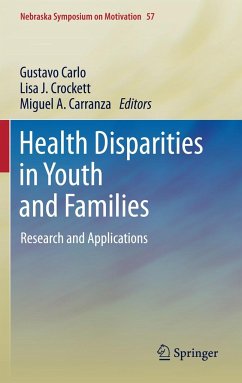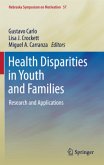This volume of the Nebraska Symposium on Motivation examines one of the pressing health concerns in the United States: health disparities due to race, gender, ethnicity, and social class, which will become a major threat to the well-being of the nation.
Amid its growing diversity and shifting demographics, the U.S. is still home to glaring health inequities by race, ethnicity, and class. Yet while it is customary to identify poverty as their root cause, other complex mechanisms are involved in their perpetuation. Based on recent major studies on African-American, Latino, Asian-American, and Native American populations, Health Disparities in Youth and Families offers a thorough, nuanced examination of a wide range of causal-and protective-factors. Rigorous theories and models take into account cultural, contextual, and personal variables, including the roles of family identity, school, and neighborhood, and motivation toward health awareness (with attention paid to less frequently studied phenomena such as within-group inequalities and the Hispanic Health Paradox). Contributors approach their subjects with realism as well as optimism as the book: povides reliable information on the scope and etiology of health disparities, identifies the methodological and political challenges associated with this issue, proposes comprehensive, integrative models for understanding disparities, features examples of innovative programs for improving minority health, includes an in-depth chapter on substance use and mental health among Native American youth, offers a useful starting point for the exchange of ideas necessary to address health disparities. A provocative resource on a pressing social concern, Health Disparities in Youth and Families is necessary reading for health policy researchers, health care providers, and others dedicated to better health outcomes for all Americans.
Amid its growing diversity and shifting demographics, the U.S. is still home to glaring health inequities by race, ethnicity, and class. Yet while it is customary to identify poverty as their root cause, other complex mechanisms are involved in their perpetuation. Based on recent major studies on African-American, Latino, Asian-American, and Native American populations, Health Disparities in Youth and Families offers a thorough, nuanced examination of a wide range of causal-and protective-factors. Rigorous theories and models take into account cultural, contextual, and personal variables, including the roles of family identity, school, and neighborhood, and motivation toward health awareness (with attention paid to less frequently studied phenomena such as within-group inequalities and the Hispanic Health Paradox). Contributors approach their subjects with realism as well as optimism as the book: povides reliable information on the scope and etiology of health disparities, identifies the methodological and political challenges associated with this issue, proposes comprehensive, integrative models for understanding disparities, features examples of innovative programs for improving minority health, includes an in-depth chapter on substance use and mental health among Native American youth, offers a useful starting point for the exchange of ideas necessary to address health disparities. A provocative resource on a pressing social concern, Health Disparities in Youth and Families is necessary reading for health policy researchers, health care providers, and others dedicated to better health outcomes for all Americans.
From the reviews:
"The editors have successfully compiled the work of stellar researchers who ... meet and exceed the gold standard for contemporary research by offering outstanding examples of longitudinal investigations that effectively illuminate pathways to the manifestation of health disparities for youths. ... urgent and mandatory reading for any investigator conducting health disparities research, those taking courses covering health disparities, practitioners designing and delivering interventions intended to address/reduce/eliminate health disparities, funders of grants designed to support the next generation of health disparities research, and policy makers." (Barbara C. Wallace, PsycCRITIQUES, Vol. 56 (39), September, 2011)
"This volume spotlights health disparities among youths and families from diverse fields and perspectives. ... Students and professionals practicing in various disciplines and those who work with children and families would benefit from reading this book. Carlo, Crockett, and Carranza have thoughtfully included a depth and breadth of topics that manages to be both understandable and applicable to the expert and novice ... . Each chapter takes great care to emphasize how the research presented is functional for varied audiences." (Christine M. Rine, Health and Social Work, Vol. 37 (1), February, 2012)
"The editors have successfully compiled the work of stellar researchers who ... meet and exceed the gold standard for contemporary research by offering outstanding examples of longitudinal investigations that effectively illuminate pathways to the manifestation of health disparities for youths. ... urgent and mandatory reading for any investigator conducting health disparities research, those taking courses covering health disparities, practitioners designing and delivering interventions intended to address/reduce/eliminate health disparities, funders of grants designed to support the next generation of health disparities research, and policy makers." (Barbara C. Wallace, PsycCRITIQUES, Vol. 56 (39), September, 2011)
"This volume spotlights health disparities among youths and families from diverse fields and perspectives. ... Students and professionals practicing in various disciplines and those who work with children and families would benefit from reading this book. Carlo, Crockett, and Carranza have thoughtfully included a depth and breadth of topics that manages to be both understandable and applicable to the expert and novice ... . Each chapter takes great care to emphasize how the research presented is functional for varied audiences." (Christine M. Rine, Health and Social Work, Vol. 37 (1), February, 2012)








